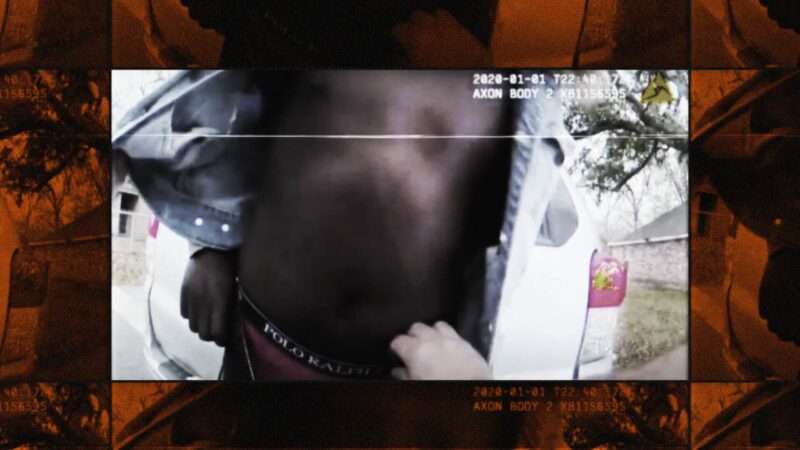
The city of Baton Rouge tried to throw a law professor in prison after he shared publicly available body camera footage showing police officers strip-searching a minor in public. On Friday, a federal judge ruled that this violated the First Amendment.
That footage, originally shared with Reason, was captured at a 2020 traffic stop. Baton Rouge Police Department (BRPD) officers cuffed 23-year-old Clarence Green and his 16-year-old brother, pulling down their pants on the sidewalk to look for drugs. Officer Troy Lawrence Jr. and then–Sgt. Ken Camallo subsequently went to the family’s home and searched it, weapons drawn, without a warrant.
When the story sparked considerable outrage, the government zeroed in on Thomas Frampton, the attorney who represented the Greens and disseminated the clips, which were already a part of the public record. During a May press conference convened to address the video, East Baton Rouge Parish Attorney Anderson “Andy” Dotson III notified Frampton that the government would seek to hold him in contempt of court, which carried up to six months in the East Baton Rouge Parish Prison.
“In measuring ‘the significance of [Frampton’s] alleged criminal activity’, the Court finds under the circumstances of this case, there was no criminal activity,” writes Judge John W. deGravelles in a 92-page opinion published Friday. “Frampton released a Video that was in the public domain, belonged to his clients, and he released it on the instructions and with the knowledge of his clients.”
The footage of Camallo’s warrantless home entry might be an even bigger headache for the BRPD that the public strip-search. This was his third such search in under three years. He has since been demoted, but he’s still with the department.
“BRPD officers’ contempt for the constitutional rights of everyday Baton Rouge citizens, like the Green Family, is jaw-dropping,” Frampton declared in a public statement. “But then you see how the lawyers who defend and enable these officers act, and it makes a lot more sense. Sadly, it’s the taxpayers who will end up paying for their misdeeds.”
Indeed, the Green family reached a $35,000 settlement with the city after Clarence spent five months in jail. The government moved to dismiss its case against him, and a federal judge agreed—but not without first benchslapping the state for actions that could be criminal.
“Such an intrusion, in abject violation of the protections afforded by the Fourth Amendment of the United States Constitution, which protects citizens against unwarranted governmental intrusions in their homes, may justifiably be considered to be a trespass subject to prosecution under” Louisiana law, wrote Judge Brian A. Jackson of the U.S. District Court for the Middle District of Louisiana.
The city of Baton Rouge insisted that it was Frampton who violated the law, by disseminating the video. But it was the city that put that footage into the public record in the first place.
DeGravelles thinks this was never really about prosecuting someone for breaching the law. Instead, he says, it was about revenge and skirting accountability. “The record is replete with evidence,” he writed, “that the City/Parish would not have pursued this matter in the absence of its bad faith motive to retaliate.”
The post Judge: Baton Rouge Violated the First Amendment by Trying To Imprison a Professor for Sharing Body Camera Footage appeared first on Reason.com.
from Latest – Reason.com https://ift.tt/33kg5Lt
via IFTTT